I interviewed Douglas Coupland in London in 2004, soon after the publication of Hey Nostradamus! With the 'Douglas Coupland and the Art of the Extreme Present' virtual conference coming up very soon, I thought I should publish an edited version of the interview. The original transcript was published on Culturewatch and has been unavailable online since 2015. At the time of the interview, I worked with Damaris Trust, which was focused on relating Christian faith and contemporary culture. A pilot Damaris discussion group started in 1995, and, if I remember correctly, Generation X (published 1991) was the first book we discussed. It brilliantly caught the zeitgeist of the late 1980s and early 1990s, which is why its title soon started being used to label a generation. I met Doug in the lounge of the Covent Garden Hotel in London. We had not been talking long when Eastenders actress June Brown came in with a small entourage for a photoshoot at the other end of the room. Doug, who was tired, found this very distracting, not least because he had no idea who June Brown was.
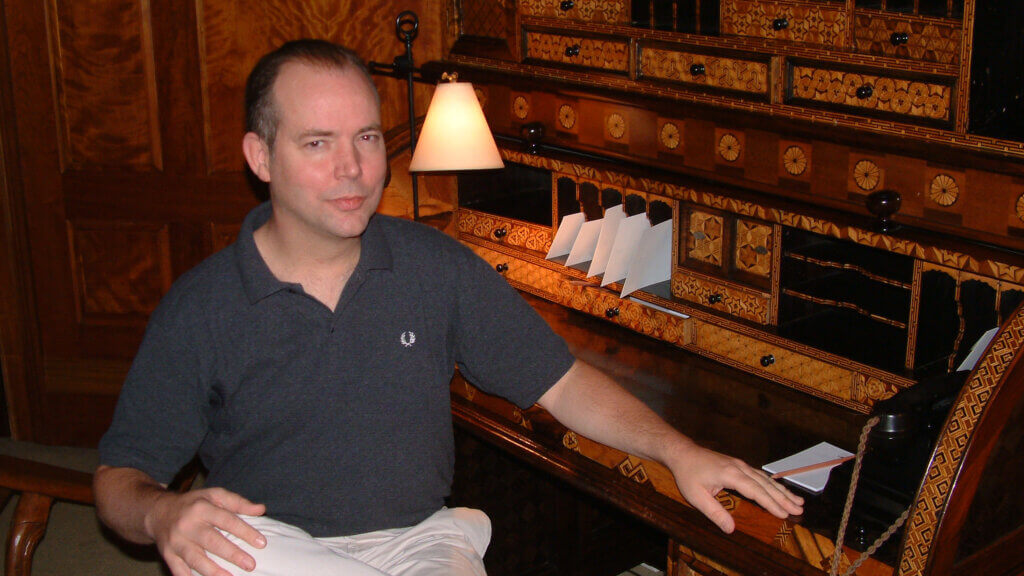
I ask Doug how he perceives culture to have shifted between Generation X, which he wrote in 1989, and Hey Nostradamus! He asks me to imagine transporting someone from 1989 to 2004. Insisting that he is only speaking for himself, he says that the ‘porosity of information right now is just shocking’. He recalls watching Wim Wenders' 1991 film Until the End of the World, set in 2000, in which people were exchanging moving text and images: ‘I thought, That’s ridiculous, that could never happen. And of course, it’s everywhere; it defines our era.’
Doug realises that I am more interested in how it feels to be ‘inside the head and the soul now, as opposed to then.’ Looking back, he believes that he and others were ‘naïve about so many issues’. He clearly sees the intervening years as a time in which western culture lost its naïveté, partly because of ‘the over-availability of information’ and, obviously, events in the wider world. Doug doesn't refer to 9/11 explicitly, but in 2004, that horrific day still loomed very large in our minds: ‘There’s a little bit less sense now that the centre is going to hold than there was back then. And that suicide-bombing mentality certainly defines our era.’ He believes that things are ‘very fragile. The interconnectedness of the world is far more evident now than it ever was.’ Is life more fragile now than in the days of Generation X? ‘I think that people worry about their children more than they did in the past.’ he replies. ‘It used to be just, “Don’t accept candy from strangers,” and now it’s like, “Look out for the entire world the rest of your life.”’
Doug remarks about how disturbing it is to see barbed wire and armed guards even at elementary schools when he goes to Los Angeles, and recalls seeing a sign in Anchorage that read ‘Drug-Free School Zone’. He wonders, ‘how do you respond to all this and not make a psychotic break? Or how do you experience all this and not feel schizoid? And how do you just manage to have some sort of serenity?’ This is something he has been thinking about: what will enable us to ‘cope not only with what’s going on now, but whatever tsunami it is that’s coming toward us in the future.’
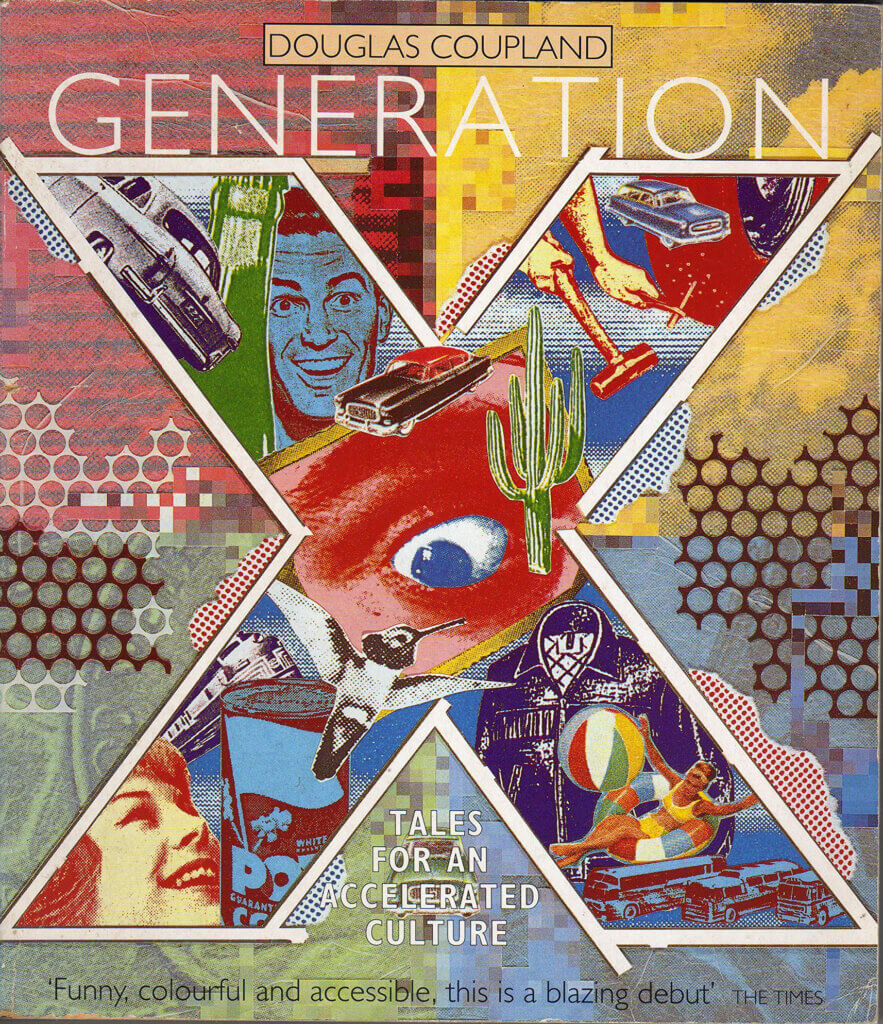
Coupland first suggests what he calls an 'occupational' strategy as part of the answer: ‘simply the best insurance you have against the future, as well as the best advice for the future (it works both ways) is figuring out what it is you like to do, what you like.’ He laments that schools don't teach this and proudly tells me about his brother Tim's years success as a champion taxidermist after years of trying to do other things which he didn't enjoy. ‘The people I know who are, by and large, happy,’ says Doug, ‘are the ones who are doing what they enjoy doing. And that’s a very simple thing.’ The other side of the coin is to ‘figure out what it is you don’t do well, and then don’t do it. I learned that four years ago. Boy, did that change my life – I wish I’d known that a long, long time ago . . .’ What has he stopped doing? ‘Cleaning – in any form! Picking things up. I just completely gave up on that, and now I don’t do it. I have other people to help me, and life is just – wow! I feel reborn, almost!’ Doug adds, ‘I have this rule which is that, if it feels like homework, don’t do it. Just don’t, don’t do it. And of course you say that, and you have responsibilities. Sometimes you just have to deal with the fact that it’s homework.’
We return to Hey Nostradamus! as Douglas Coupland goes on to talk about a more philosophical or spiritual part of the answer to how we cope with both the present and the future. He refers to 1 Corinthians 15:51–52, which he uses as the epigraph of Hey Nostradamus! Doug first saw it on the tombstone of one of the kids that was killed in Columbine: ‘I read that passage, and it just – wow! What it’s saying, I think, is that heaven and hell are just a breath away.’ He's quoting Andy Warhol, who was painting Heaven and Hell are Just one Breath Away! just before he died. ‘At any moment something startling could happen to you, something amazing. Suddenly – no matter what you’re feeling – the world would become charged with meaning and the feeling of something better.’
Coupland highlights the tension at the outset of Hey Nostradamus! – on the page after the epigraph, Cheryl says that at any moment any of us are capable of all sins. Doug starts listing possibilities: ‘I could pull out a knife and stab you to death, I could steal your machine, I could blaspheme, I could attack any of those people over there . . . . ’ – he glowers again at the noisy crew at the far end of the room who have no regard for us at all – ‘the whole list of sins that you can commit is infinite.’ Doug describes the contrast at the start of the book as an ‘alternate polarity of light' between the Corinthians text, ‘which is a visitation from beyond’ and the sin – ‘you could call it ultra-sin, or hyper-sin’ – at the heart of Hey Nostradamus! 'That to me sort of defined the book,’ he concludes.
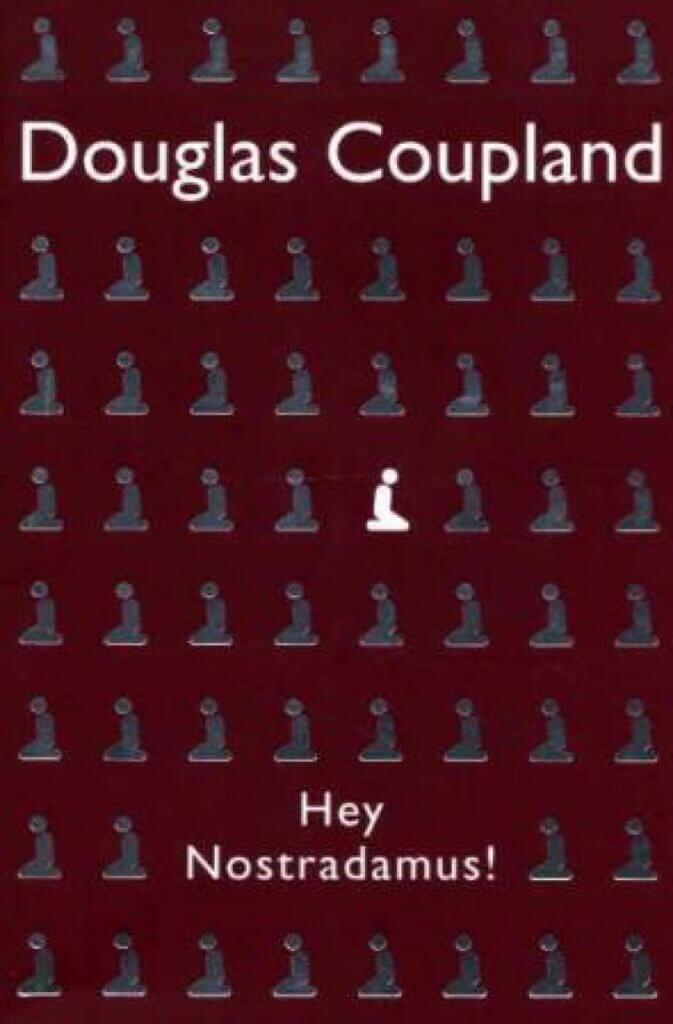
The first of the four narrative voices in Hey Nostradamus! is Cheryl, an evangelical student who has been killed in the shooting and who speaks from sort of liminal space between death and heaven. ‘There’s a purity to Cheryl’, Doug says, before summarising the others: Jason (the shooter) and Heather are ’screwed up’ by ‘just life, or attrition, or whatever’. The coda at the end is in the voice of Reg, the father of Jason. Doug describes him as ‘a miserable bastard who you hate, hate, hate, who must die, die, die. And yet he’s the one who actually ends up being humanised.’ Coupland stumbles over the best way to describe what happens to Reg before settling on the fact that he lose everything – ‘all his valuables in this world, sort of like Job.’ The moment that happens, ‘the moment he shatters a legalistic doctrinaire thinking and began actually questioning things for himself, suddenly he became real.’ Doug sounds as surprised as I had been when reading Reg's transformation. ‘I can’t believe I’m liking this guy,’ he says. ‘Like, this is so shocking.’
I presume that Reg had to come last because such a transformation would not have worked without having the other three characters expressing their thoughts first. It is a result of one of Doug's convictions: ‘See, I believe that there’s something to believe in: I believe that people are more good than they are bad.’ He breaks off and changes tack. ‘Let’s break out a Microsoft pie chart and look at the way I spend my day thinking. I think there’s a big pizza-shaped slice of my life that I spend thinking about God, and I think that might be more than most people (or maybe it’s small – I don’t know! Maybe we should all have little pie-charts in our chests that show what we’re thinking in the day. It’d be really neat!).’ Coupland is becoming the most animated he has been in the conversation so far, and the disturbance at the other end of the room is temporarily forgotten.
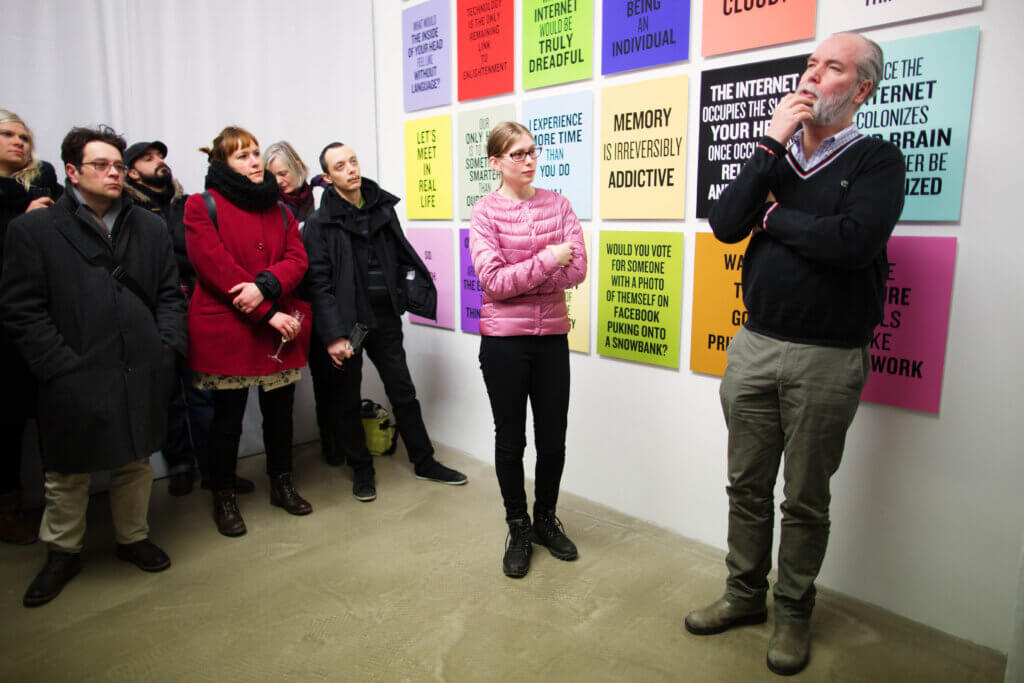
I think about this a lot and what I’m learning is that . . . OK, your relationship with God – the moment you think, “OK, well I’ve figured that out! Next!” is like the moment it ends. And it’s not something you renegotiate once a week at church, or even every day. Every moment of your life you should be renegotiating that.’ We have circled back to Doug‘s thoughts on what we need to cope with life. This relationship with God and its renegotiation is, he says, one of the things that will ‘help you stay alive and capable of dealing with the world as it’s playing out.’ In fact, what happens earlier in the book is to get Reg to discover exactly this. ’OK, now that’s the point you have to get to . . .’
There is an extraordinary progression from Generation X where, although religion is mentioned at times, the world feels very secular with very secular characters. There is a little questioning in Shampoo Planet, but spirituality becomes a very important factor in Life After God (1994), which concludes with a powerful heart cry at the end:
I need God – that I am sick and can no longer make it alone. I need God to help me give, because I no longer seem to be capable of giving; to help me be kind, as I no longer seem capable of kindness; to help me love, as I seem beyond being able to love.
Douglas Coupland. Life After God (London: Simon and Schuster, 1994), p. 359.
Girlfriend in a Coma culminates in a powerful plea to the characters – and readers — to search for truth, regardless of the personal cost:
[I]n your new lives you’ll have to live entirely for that one sensation – that of imminent truth. And you’re going to have to holler for it, steal for it, beg for it – and you’re never going to stop asking questions about it twenty-four hours a day, the rest of your life. . . . Every day for the rest of your lives, all of your living moments are to be spent making others aware of this need – the need to probe and drill and examine and locate the words that take us to beyond ourselves.
Douglas Coupland. Girlfriend in a Coma. (London: Flamingo, 1998). p. 268.
Having an evangelical Christian as one of the narrative voices in Hey Nostradamus! feels like another significant step. Coupland believes ‘every book has to show some sort of experiment, and hopefully progression. And sometimes experiments fail miserably like Shampoo Planet’. The experimental nature of Coupland‘s work was evident from the outset, with slogans, definitions of new words (some of which, like McJobs had a life way beyond the book), and graphic elements in the margins of Generation X. Doug did not train as a writer but went to art school: ‘it wasn’t even academic, it was studio’. He came to writing through the text-based artists like Jenny Holzer in New York in the early 1980s, where ‘words were just art supplies.’ He expresses sadness at the lack of communication between the art and literary worlds – ‘that’s sort of the necessary hybridisation that has to happen next’. He is aware that the evolution in his work is the opposite of the predictability that the publishing industry wants, but he thinks that, with Hey Nostradamus!, ‘people are realising, “Oh, with Doug, every book’s different.” So that becomes the predictability, which is nice, but within that there must be progression, and it’s not just in terms of techniques.’
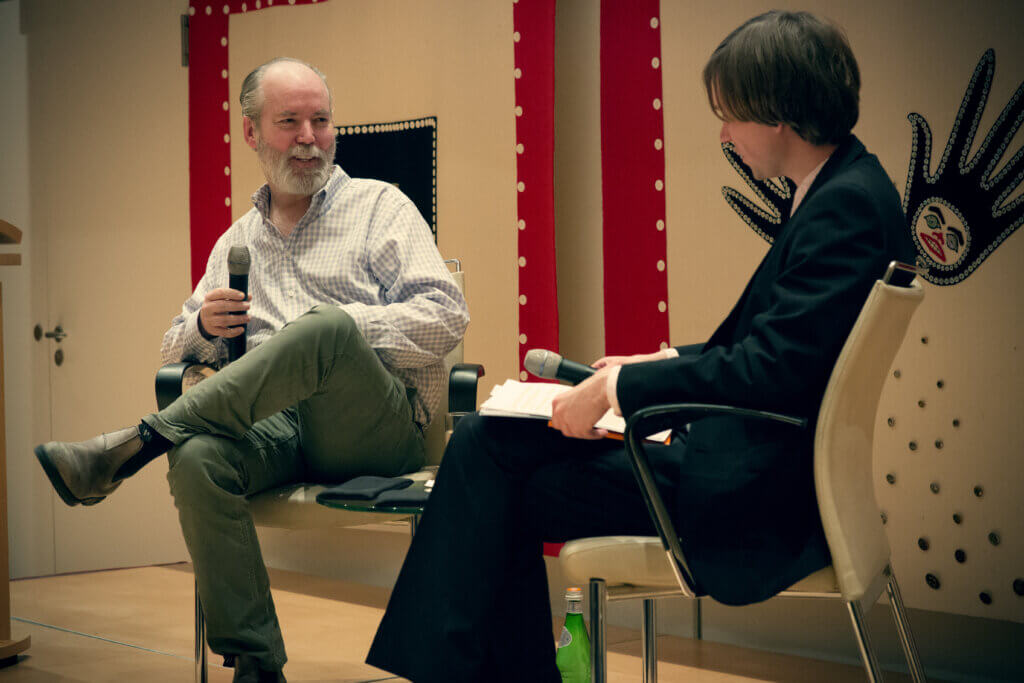
Coupland believes that he has become a much better craftsman with words, but the important thing with every book is to ask, ‘what’s changed in your life? And how has it changed you? And how is that going to be reflected in the work?’ He reflects on the way that thinking patterns and life strategies that worked during one‘s twenties will not work through the rest of life (‘If you do try to employ them and they somehow do work, then it’s kinda pathetic. It’s like someone 50 trying to dress like a 20-year-old – it just looks bad. You’ll notice I don’t try and dress young!). He suggests that he needs to be deliberate about finding new strategies at each stage of life.
Doug talks about having an ‘electively secular upbringing’, which is reminiscent of the narrator of ‘In the Desert’ in Life After God, who says:
I had been raised without religion by parents who had broken with their own pasts and moved to the West Coast – who had raised their children clean of any ideology . . . at the end of history, or so they had wanted to believe.
Douglas Coupland, Life After God (London: Simon and Schuster, 1994), p. 177–178.
Coupland says he was around 25 before ‘I finally figured out anything’. He’s still probing at the roots of the progression in his thinking: ‘nature or nature, I don’t know’. He thinks that three of his great-grandfathers were ‘Bible-thumpers’ who ‘came to the prairies in the early part of the 20th century.’ He clearly has huge admiration for their determination: ‘I can’t think of a more unforgiving, an oppressing, a dismal desert, basically, than going from High River, Alberta, to Saskatoon, to Brandon, Manitoba. Always in a wagon, always trying to be that “cry” out in the wilderness.’ This seems to have provoked something of a reaction in their children: Doug’s grandparents on his mother’s side, and to a lesser extent on his father’s side, ‘became metropolitan. They just didn’t want to be a part of that any more. And then they had their relationship with my parents, which my parents don’t discuss much – even when I really press them. So something happened. And then they did the North American thing – they cut loose and . . . stowed the wagon and went west.’ His parents evidently embraced secularism, but he doesn’t seem to know why. ‘They’re both bright people,’ he notes. ‘My mother has a degree in comparative theology, so her decision wasn’t all just instinct and hunch.’
All this makes Coupland wonder about raising children: ‘Even if you try to make your children the opposite of everything you came from or wanted them to be, you’re sending them so many signals and you’re not even aware of it, behaviourally. I think that’s why the sins of the fathers are visited on the [children]. I think that’s where that comes from. I mean, it’s not even biblical, it’s just Desmond Morris, you know!’ So there were ‘signals’ of some sort or another in his upbringing, ‘But there was nowhere to put those signals.’ His writing is his attempt to process those signals, and subsequent ones. He describes his treatment of them in Girlfriend in a Coma as ‘pure instinct’, but Hey Nostradamus! is ‘far more cognitive’. Amazingly, Doug maintains that,
there’s like no one in my world I can discuss religion with. No one in Vancouver where I live. It’s very strange. It’s like there’s this huge . . . it’s the elephant in the room that no one’s talking about [he references Gus Van Sant’s 2003 movie, Elephant, which is based on Columbine]. So here I am, there’s this huge elephant which I’m always thinking about, grabbing this pizza-pie slice of my day, and no one’s talking about it.
Whatever conversations Hey Nostradamus! has stimulated among Coupland’s fans, it hasn’t opened up space to talk about spirituality with those close to him:
I wrote this book and it’s like a shriek from the wilderness, and so I gave it to my parents and friends and family members. And it’s very difficult, very weird, when you hand a book to your family because my dad doesn’t read, period, except for what I write. Mom never reads fiction; there’s no real readers in my family. And so they read it, and they say, ‘Oh, I’d no idea you’d thought about this so much.’ And then they change the subject, and that’s where it ends. And I think I’m not going to be condemned, and my shriek’s devoid because there’s still no one to discuss these things with.
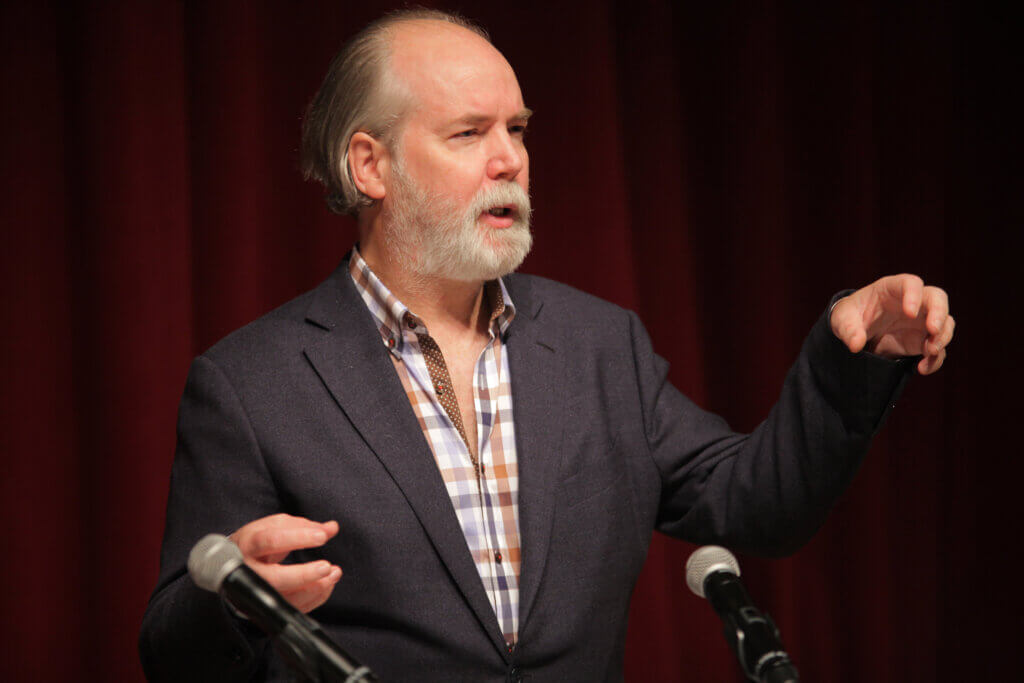
Doug says he used to think that the easiest way to clear out a room was to start talking about loneliness, but he’s concluded that the easiest by far is to say, ‘“Hey, let’s talk about religion and God,” and everyone flees. And why is that? And how did it become so stigmatised? Why won’t people discuss it?’ I wonder if this is something that’s particularly true of Canada. South of the border, in the USA, Coupland says there are ‘so many denominations’ who are ‘all quite convinced that theirs is the absolute one. And where there should be unity and consensus, there’s just this battle that drives me nuts.’ He sees his approach to discussing the issue as ‘an almost general kind of European way’, which just makes Americans look askance at him: “‘You’re an enemy, because you’re thinking outside of my doctrine,” and this is frustrating.’
I ask Doug about his high school experience with Young Life, a Christian group similar to ‘Youth Alive!’ that Cheryl and Jason are part of in Hey Nostradamus! He tells me about the posters they put up around the school advertising events like barbecues or hiking trips, and says, ‘I thought it was just this group who hung out or something. So I said, “I’d love to come to the barbecue.”’ But their response was ‘Er, no.’ Later, Doug said he’d like to join them for another event, but was again rebuffed. He says he was 25 before he realised that it was a Christian group. ‘I think something happened at 25 and I became aware or something,’ Coupland reflects, referring back to his realisation of how secular his upbringing was. He wonders how different his life would have been if they ‘just invited me to a barbecue or something’.
I think Doug was treated shamefully by that high school group, but he is sanguine: ‘But they’re a clique, and cliques are cliques. And besides, you know what? They’re young.’ Doug sees them as the product of what their parents put them, ‘so you can’t say the fault’s their fault, or even that they’re subtly at fault.’ He remarks that high school in North America is ‘the most consensual, massively-shared experience in a way that Europeans can’t even begin to fathom how important it is’. He adds that it is ‘fantastically hierarchical’ and talks further about his personal experience of that age group: ‘Every high school has the good-looking-girl gang. And all the members of the good-looking-girl gang, shortly after graduation, became evangelical, and the ones that didn’t become evangelical married police or firemen. The only reason I know is because it’s almost tabloid – everyone wants to know, “What are the good-looking girls doing?”’ Doug insists that he is not being facetious: ‘It was like there was some authority, or some sort of authority, lacking from their lives.’ Some of this experience ‘leaked out in Cheryl’.
We return to talking about the progression of Coupland’s thinking about God. I remark how I’m struggling to get my head round an upbringing almost devoid of even the concept of God. Doug insists that he is not exaggerating: ‘There’s nothing to exaggerate because there’s nothing there.’ What made him aware of the elephant in the room? He recalls a New York Times book review by Michiko Kakutani in which she claimed there’s no politics, there’s no God (‘Like, God was just one of the things on a list that I remember.’) It made Doug think, ‘Oh, there isn’t, is there?’ He started looking at movies and TV, and found it very strange that in ‘any generic adventure’ the hero’s ‘family life, or their interior life, or their political life is never, ever addressed – ever. It’s as if, whenever they’re in trouble they can’t just phone their family or friends; they have to blow something up.’ This, Coupland thinks, is ‘the way our culture deals with metaphor’, and he became hyper-aware of it. ‘I know people think about this . . . and so this is my way of giving voice to it.’ That one review was ‘like, the spark’.
I mention a review of Hey, Nostradamus! which framed it as an attack on religion. Coupland strongly denies this: ‘I would never do that. It’s a non-censorious critique.’ Could the motivation for the reviewer’s perspective be the way Reg changed his thinking and the lack of answers for why all the suffering happened? Doug quotes The Pet Shop Boys’ ‘Love Comes Quickly’: ‘Just when you least expect it, just what you least expect’, and links it back to the Corinthians passage. He sees this lyric and ‘Heaven and hell are just one breath away’ as ‘encapsulations of that passage’. He again refers to Reg as a Job-like character and reflects, ‘In the end there has to be hope. There just has to be hope, and I think in this case, giving hope to the one who seems most beyond it is not meant as an intentional shocker, but it is meant to say that there is hope.’
I suggest a link between this statement and Jason’s words, ‘We mean something. We must’ (Hey Nostradamus! p. 146). Coupland sees Jason as wondering whether we are simply ‘just ants on an ant-hill’, whereas he believes that we are not: ‘What separates us from everything else that stayed back in the garden is that we do have free will and we have time, and that’s both our curse and our blessing.’ Jason wants to see himself as an individual who somehow counts. ‘Everyone is obviously an individual,’ Doug says, ‘but you’re not indispensable. The world will go on with or without you, and your existence has been noted in the book of life, but also remembering that the world has to go on. I’m not quite sure he reaches that point.’ Coupland note that Jason is the ‘son of a preacher-man’ – ‘they’re the ones who, you know, blow up cars and get caught vandalising or whatever because they’re being contrarians.’ We’re back to parental influences on our lives again, and I tell Doug that my father was a minister, but that my sister and I went in opposite directions in relation to faith. He wonders if that is because of nature or nurture. I suggest it might be anti-nurture. ‘Oh, ok, a reaction,’ he replies. ‘I guess that if she has kids, they’re probably going to frustrate her in the exact same way.’
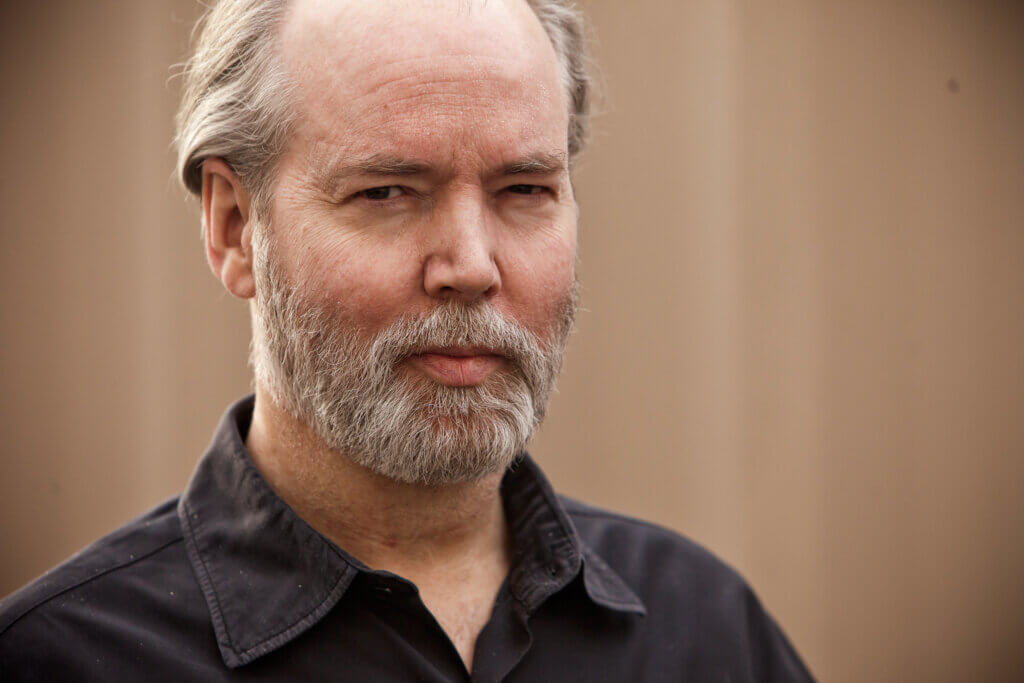
‘How do you ever break the chain?’ Doug asks. He muses on the possibility of a religious chain-breaking superpower: ‘I am Chainbreaker, I officially break you away from your past, and your nurture, and you can be genuinely new – you can be Superman, or something.’ Coupland tells me about a short piece he’s recording for the BBC on the subject of superpowers. In his previous novel, All Families are Psychotic, Wade says he would be Kindnessman, so he could point at someone and they would become kind. ‘And so I thought about that some more, and you know, the superpower you choose defines you. I thought, wouldn’t it be wonderful if you could just look at someone and, without their even knowing it, just go ‘Shazam!’ and suddenly the world is that incredibly large, beautiful, magic, astonishing place where, just when you least expect it, something grand happens to you? Visions of grandiosity – sorry!’ Doug is grateful for his ‘really unusual life, both electively and you know, through good luck, hard work or whatever’ and admits that he could easily ‘squander that, and go off and write film scripts or something in Bel Air. I really could if I wanted to, and I’m not going to do that, so what am I going to do?’ He would like to ‘awaken that sense of awe and mystery’ in the world, but recognises that ‘‘if you try and do that overtly, it gets corny or it looks like you’re trying to be grandiose’. There’s a fine line to walk: ‘If people sense you’re preaching, they’ll reject you. If people think you’re trying to send them some sort of subliminal hidden message, they’ll reject you. So it has to be conversational, it has to be genuine.’
I point out that Richard preaches strongly at the end of Girlfriend in a Coma and wonder how people have responded to that passage. Coupland says that people want to know what they should do: ‘Obviously we can’t go out there and, you know, sit on a street corner, and hand out leaflets, because that’s just not something that’s going to work. But you have to figure out what is it you do well, which gets back to what we were talking about earlier.’ By doing something well and enjoying it, he says, you ‘gain an authority of some sort’. From that authority and the respect that accompanies it, ‘you can change the world; you can change the lives of your children, or your students, or the people you work with.’ It might be entirely through being an example rather than through words as ‘direct proselytising almost never works.’ I reflect on my own experiences of talking about the meaning of life with people – usually in the context of a relationship where engagement and dialogue helps people to shape their ideas. People may agree or disagree at the end, but they are clearer about what they do believe. ‘Or even better,’ suggests Doug, ‘“I’ve never thought of that before,” which is almost the best response you can get to a question of any sort. Once you realise you’ve never thought about it before – think about it! Which is a step which is not always taken.’
We’re circling back to the ‘God’ question again. I suggest that Doug seems to think that there is something there so I ask him directly about his understanding of God and of the nature of God. He is adamant that he does not believe an anthropomorphic God with ‘the white robe and the hair’. Doug seems to head off on a tangent about science, telling me about his silver medal in the British Columbia Physics Olympics in grade 12 (which as a former physics teacher I’m ridiculously pleased about), and his dislike of biology, but this gets him to his point: ‘To me the wonder is the eye, or a protein molecule, or DNA, or the fact that we have the only creatures in the world that we do have. I’m sorry, that was not chance. It just simply wasn’t chance. There’s no way – even if the universe was infinite, there’s still no chance that it could have happened.’ So ‘there was design. Who designed it, and why did they design it?’ He continues, ‘Maybe God’s a composite entity, I don’t know, but there had to be a reason for it. And there’s so many ways of looking for the reason of why we might be here. And I think why, of all of these organisms on earth you and I were given time and free will? Why us, you know? It’s not a task, but it is a responsibility, and how do you honour that?’ Coupland knows how important these questions are: ‘I don’t think we’re ever going to figure out exactly who did and why, not in our lifetimes at least, but you have to keep thinking about it, you have to keep thinking about it.’
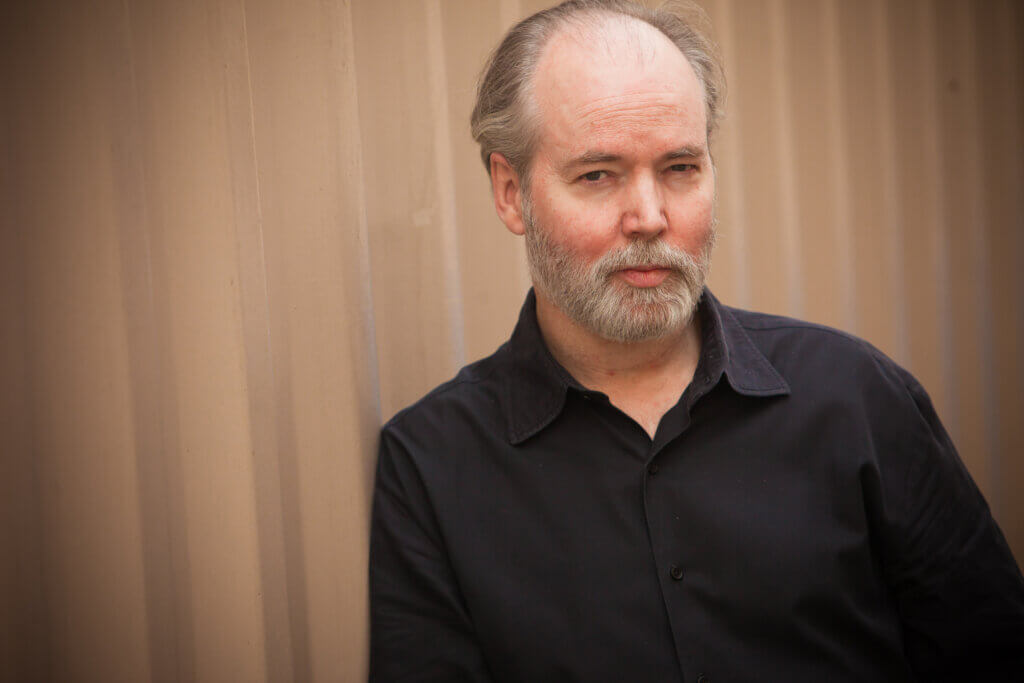
I wonder how Coupland might respond to the Christian claim that the creator God has revealed and communicated himself in the words of the Bible and supremely in the person of the Lord Jesus Christ. He pauses for a long time before venturing, ‘Well, I don’t think God would’ve made us curious for no reason. Of course we’re going to think about it, and let’s face it, it’s interesting.’ He sees the science approach as ‘just another way into the question’ which cannot be rejected out of hand: ‘it’s just one more entry point for a certain kind of person.’ He thinks ‘you should have as many entry points as you can, so I don’t think you should dismiss the “Why did he do it?”, the why, because that’s just shutting doors that should be left open.’ I’m unsure if he thinks I am dismissing the why question, but he presses on to talk about the Bible: ‘It’s like 66 books, it’s not one. And there were all these other ones that were, what was it, Gnostic texts?’ There were very good reasons why they were not included in the Bible, but there is no time to get into that issue.
Doug tells me he prefers the Old Testament to the New Testament, ‘from a writerly standpoint, which is something no one ever talks about. I just think the metaphors are better.’ He sees it as ‘a little more reductive, I think, but of course, without Christ, without the New Testament, how else are we going to have redemption?’ He thinks the books of the Bible have been tampered with: ‘It’s obvious because I write for a living,’ he says. ‘It frustrates me. Like who tampered with them? Why? When did they do it? Can we still get them back?’ He sees reading biblical texts as a constant renegotiation: ‘We have to look at a passage, and I think you have to say, “OK, this is what survived: what meaning do we get from it? Does it feel like there was something else that was once attached to it?” And I don’t think it’s heretical or wrong to try and question . . . Well, it’s a historical fact, it’s been tampered with, so who might’ve tampered with it? Are there any other possible meanings that would happen if you changed one word around? Is that considered bad or good or . . . .?’
I hesitantly challenge Coupland’s line of argument as he is expressing views on the biblical text that have been challenged by scholars in textual criticism who are increasingly concluding that this has been tampered with less than we had thought. I mention some current views on the reliability of the Gospels and tell Doug that scholars are concluding that Luke was one of the best historians of the ancient world, and that all the Gospels are historically reliable eye-witness accounts. ‘But I just know it’s been tampered with,’ Doug replies. ‘Sorry. And I just think, whoever tampered with it, that was such a disservice to humanity – how could you, how dare you?’ He suggests that, ‘Hopefully through living well, and living with some sort of open soul, we can redress or correct that.’ He is frustrated that our time is up: ‘Oh, I could go for hours here’, but the car is waiting for him. I am also frustrated as our conversation has gone beyond a straightforward interview and has taken us to the heart of some of the biggest issues.
https://www.paullowedentistry.co.uk/cheap-levitra/Coupland invites a final question, so I ask him the biggest of all: what about Jesus and his extraordinary claims to actually be the very revelation of God and to be God – God’s Son, actually incarnate. Doug laughs at such a massive question to end with and says, ‘Well, given the choice of believing or not believing, I’d believe. I tend to look at metaphor. I think metaphorically so I’m not a literalist, I’m not a legalist and . . . See, by saying that, I’ve pissed off how many people? I’m not a doubter, but in terms of the literary and the mechanical nature of the way that information is transferred, I just have to.’
Image credit: Kris Krüg, used under a Creative Commons licence.
https://www.paullowedentistry.co.uk/cheap-levitra/